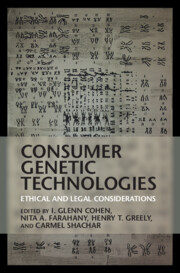Book contents
- Consumer Genetic Technologies
- Consumer Genetic Technologies
- Copyright page
- Contents
- Contributors
- Acknowledgments
- Introduction
- Part I Consumer Genetic Technologies: Rights, Liabilities, and Other Obligations
- Part II Privacy in the Age of Consumer Genetics
- Part III Tinkering with Ourselves: The Law and Ethics of DIY Genomics
- Part IV Consumer Genetics and Identity
- Introduction to Part IV
- 13 Generational Failures of Law and Ethics
- 14 Precision Medicine and the Resurgence of Race in Genomic Medicine
- 15 Losing Our Minds?
- 16 Investigative Genetic Genealogy and the Problem of Familial Forensic Identification
- Part V The Impact of Genetic Information
13 - Generational Failures of Law and Ethics
Rape, Mormon Orthodoxy, and the Revelatory Power of Ancestry DNA
from Part IV - Consumer Genetics and Identity
Published online by Cambridge University Press: 27 August 2021
- Consumer Genetic Technologies
- Consumer Genetic Technologies
- Copyright page
- Contents
- Contributors
- Acknowledgments
- Introduction
- Part I Consumer Genetic Technologies: Rights, Liabilities, and Other Obligations
- Part II Privacy in the Age of Consumer Genetics
- Part III Tinkering with Ourselves: The Law and Ethics of DIY Genomics
- Part IV Consumer Genetics and Identity
- Introduction to Part IV
- 13 Generational Failures of Law and Ethics
- 14 Precision Medicine and the Resurgence of Race in Genomic Medicine
- 15 Losing Our Minds?
- 16 Investigative Genetic Genealogy and the Problem of Familial Forensic Identification
- Part V The Impact of Genetic Information
Summary
The ethical and religious implications of consumer DNA testing are particularly fraught for deeply orthodox Mormons. Within the Latter-day Saint faith, the obligation to discover and build the relational structure of family across generations forms a core religious duty. Mormons have long fulfilled that duty through genealogical research, creating elaborate family group sheets and detailed pedigree charts. Their genealogical research then provided the foundation upon which for-profit companies like Ancestry.com began and continue to build.The fulfillment of religious duty through the biotechnology of DNA testing revealed a rape my mother suffered decades ago, a secret she considered sin. Across the decades, law failed my mother in so many ways.Although she chose anonymity and silence for 57 years, the relational nature of shared DNA and her granddaughter’s DNA test discounted my mother’s choice. Even if someone chooses anonymity for herself, unless all of her biological relatives do the same, she is always at risk of identification and publicity through shared DNA and genealogical databases like Ancestry.com. If law and ethics recognize an individual’s right to privacy and her claim to anonymity, how should it account for the relational nature of shared DNA that makes complete privacy, complete anonymity impossible?
- Type
- Chapter
- Information
- Consumer Genetic TechnologiesEthical and Legal Considerations, pp. 173 - 185Publisher: Cambridge University PressPrint publication year: 2021

